VOL. 43 | NO. 52 | Friday, December 27, 2019
After the boys of summer have gone ...
By Tom Wood
Major League Baseball is planning to eliminate 42 of its 162 minor league teams, even after setting a minor league attendance record of 41.5 million in 2019. And while the AAA Nashville Sounds are safe from the proposed contraction, teams in six communities are not.
Tennessee is the state most affected by the proposal being spearheaded by MLB Commissioner Rob Manfred, which would take effect when the Professional Baseball Agreement of Operations expires following the 2020 season.
Tennessee Class AA Southern League affected are:
• Chattanooga Lookouts, an affiliate of the Cincinnati Reds
• Jackson Generals, an affiliate of the Arizona Diamondbacks
Advanced rookie Appalachian League teams affected are:
• Johnson City Cardinals
• Greeneville Reds
• Elizabethton Twins
• Kingsport Mets
Tennessee lawmakers are understandably hot about the National Pastime disappearing from communities. Some are taking a wait-and-see approach, while others have been more vocal.
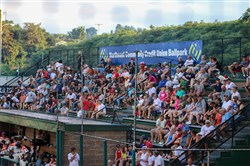
Fans pack the stands at Joe O’Brien Field in Elizabethton to watch the Minnesota Twins’ Appalachian League club. The park is about 9 miles east of Johnson City in the northeast corner of Tennessee.
-- Photographs Provided“I think minor league teams are really important to our communities,” Gov. Bill Lee says. “Our towns in this state that have minor league teams, both big and small, it’s a part of what makes the uniqueness of those towns, so we are very interested and will follow closely any change in the way minor league baseball’s structured. It matters a lot to us.”
The MLB contraction proposal has been assailed by a number of Tennessee lawmakers, including U.S. Rep. Phil Roe, one of several state politicians among 106 congressional colleagues who signed a letter opposing the proposal. Roe also met with MLB Deputy Commissioner Dan Halem.
“The 1st District of Tennessee is home to four minor league baseball teams in the Appalachian League – with a fifth right across the border in Bristol, Virginia,” Roe says. “There are ongoing discussions between MLB and its minor league affiliates about the future of minor league baseball, and since half of the Appalachian League teams play in our region, I want to be active in ensuring America’s pastime is preserved for generations to come.
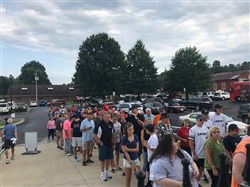
Fans wait to enter TVA Credit Union Ballpark in Johnson City
“For that reason, I met with Deputy Commissioner Halem to discuss the concerns our communities have with the potential loss of the Appalachian League and its impact on Northeast Tennessee. I look forward to continuing on working to preserve baseball in the 1st District of Tennessee.”
Small-town USA
Beyond attendance and financial concerns, having a minor league team can boost a city’s morale as residents follow the exploits and dreams of athletes hoping to someday reach the highest level.
“A minor league team can be a big deal to a small town, but most of the players on a rookie-level team have little chance of making it to the major leagues,” says longtime fan Mike Morrow of Nashville, who writes about baseball at tnprobaseball.com.
“Yet it is important for Tennessee baseball fans to realize that some big-name players, MVPs like Jose Altuve (Greeneville) and Joe Mauer (Elizabethton), a Cy Young winner like Jacob deGrom (Kingsport) and future Hall of Fame catcher Yadier Molina (Johnson City) started their professional careers in Tennessee.”
The teams in Johnson City, Greeneville and Elizabethon are owned by Knoxville businessman and University of Tennessee interim president Randy Boyd. He also owns the Class AA Tennessee Smokies. That team plays at Smokies Stadium in Kodak, near Sevierville, but there have been preliminary discussions of moving it back to Knoxville.
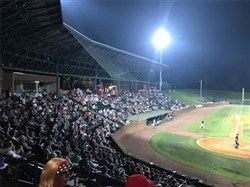
A big crowd for the Greenville Reds, who play at Tusculum University’s 2,572-seat stadium, about 27 miles southwest of Johnson City.
The four teams drew a combined 432,506 fans in 2019, an average of 8,971 per game. Chris Allen, president and chief operating officer of the Smokies and Boyd Sports LLC., recently attended the 2019 Winter Meetings in San Diego and expressed hope that a solution will be negotiated that is satisfactory to all involved.
“At the end of the day, both parties come into the room and they try to fight for what they want, and hopefully there will be a compromise on both ends and everyone will get a little bit of what they want and maybe lose a little bit of what they might have wanted,” he says “That’s the way negotiations go, you know.
“It’s a long, drawn-out process. … I don’t know where it’s going to end. I certainly hope, considering we have three Appalachian League teams, that contraction is not an option.
“I don’t know where that’s going to fall. Certainly, I think it would be a sad day if a large number of teams were contracted – or any team, for that matter. We just have to trust the process. We’re going to plan for the worst and hope for the best.”
Allen and Jeremy Boler, vice president of Boyd Sports, points to the economic impact on the cities if another slice of Americana disappears.
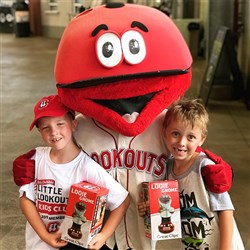
Looie, the Chattanooga Lookouts’ mascot, might be looking for other work.
“The local communities would all lose their baseball teams; all the employees, from the full-time staff to the game-day staff; let alone to the players,” Boler says. “I think they’re projecting 1,200-plus players – and not just players, but coaches and umpires, too. It’s a big shock to the system right now.
“Small-town USA deserves baseball just like everyone else,” he adds. “Dan Moushon, who is president of the Appalachian League, had all of us work on the ‘charitable contributions’ report and, I think, well, I know, all 10 teams in the Appalachian League through various donations (and) in-kind gifting impacted their communities in excess of $2 million.
“That’s a considerable amount of money in any part of the country, but certainly in the Appalachian League.”
‘Huge blow for Tennessee’
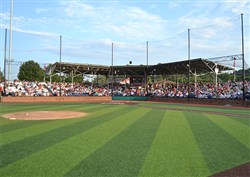
The Johnson City Cardinals, the Appalachian League champs for 2019, play in TVA Credit Union Ballpark, which seats 3,800.
The two sides of the contraction debate have been locked in what has been described as intense negotiations, reportedly discussing everything from upgraded facilities to travel, from housing to low wages and a number of other issues – including a “Dream League” that affected teams could join. Such a league would feature undrafted players and have some financial support from MLB.
They met at the 2019 Winter Meetings earlier this month in San Diego, trading barbs and digging in on their stances.
All the back-and-forth left many of teams frustrated and trying to plan for an uncertain future.
“This is a huge blow for the state of Tennessee. You’re talking about almost from one side of the state to the other where this is going to affect,” says Rich Mozingo, the president of the Chattanooga Lookouts. He was named Southern League’s executive of the year at the 2019 Winter Meetings in San Diego.
“It’s not just one little spot here, so it’s a crushing blow for the state of Tennessee.
“But we’re all sticking to the same thing. It’s early in the process, and we’re going to have to let this thing play out a little bit.”
The contraction proposal comes at the height of minor league baseball popularity. Another attendance record – 41.5 million fans – was set this year.
Lookouts co-owner Jason Freier says he remains optimistic that the team will still be playing in Chattanooga beyond the 2020 season.
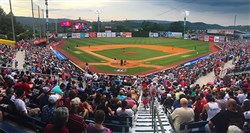
AT&T Field in Chattanooga has been the home of the Lookouts since 2000. It replaced Engel Stadium, which served the team for nearly 70 years. A replacement for AT&T is being discussed.
“I mean, you see your name attached to potential contraction, you obviously need to be concerned,” he says. “That being said, looking at it from both a macro and a micro perspective, the concept just doesn’t make a lot of sense. So my hope is, you know, sort of reason and right prevail on this.
“To me – whether you’re on the major league side of things or the minor league side of things – both of us want to be growing the game of baseball, and how better to grow it than have teams in all these communities, provide opportunities for kids and families to see games as they grow up? Getting rid of teams would be bad for baseball, bad for the communities, for the fans.”
Noting Chattanooga’s long history of professional baseball, Freier says the Lookouts shouldn’t be on the list.
“If you told me ‘hey, teams are definitely going away, it’s going to happen regardless of whether it makes sense or not’ then it doesn’t make any sense for Chattanooga to be among those teams,” Freier explains.
“Chattanooga is a great city, a thriving and growing market. It’s a place baseball should certainly want to be. Last year we were named the Southern League Organization of the Year. We were in the top half of our league in attendance. Chattanooga has a history – over 130 years – of professional baseball, which is close to unmatched across the country.”
Don’t forget young fans
Retired Cincinnati Reds broadcaster Marty Brennaman is against contraction, particularly because of the effect it will have on small towns like Greeneville, which is affiliated with the Ohio club.
“The most important problem it has that this is contrary to is finding ways to, one, attract youngsters back to the game – and I’m an old guy, so I remember how it was when I was a kid,” says Brennaman, who will be guest of honor at the Nashville Old Timers Baseball Association banquet Jan. 14.
“In the summertime, you get up in the morning and play baseball all day, might come home for lunch, might not, and at night you listen to games on the radio – and by taking baseball away from towns in the minor league, that’s going to eliminate or minimize or reduce the amount of interest that young people are going to have in this game that they’re working hard to get right now.
“Baseball does a lot of things that just make me walk away scratching my head, believe me.”
Chattanooga businessman David R. Eichenthal, managing director for PFM Group Consulting, who recently wrote an opinion piece on MLB’s contraction proposal for The Hill, says commitments to new or upgraded facilities are the key to smaller cities keeping their teams.
“When I saw the list of the cities and the teams that were the target of Major League Baseball contraction, it was a familiar list because a lot of these are cities that I’ve worked with over the last several years as they seek to overcome economic challenges,” Eichenthal says.
“We know there’s a lot of economic literature that suggests that building big new stadiums doesn’t necessarily help bigger cities with major league stadia, but there is actually reason to believe that minor league baseball can be a real economic boost for smaller cities.
“If the Major League Baseball plan goes forward and minor league baseball goes away from these places, the economic impact could be quite real. And as I point out in the article that you reference, a lot of these cities have already faced significant economic setbacks over the decades.
“They disproportionally have higher rates of poverty, are more likely to sustain population loss and high unemployment. So what I’ve said is that it’s great that Congress is stepping up in a bipartisan way to encourage Major League Baseball to stay put when it comes to these minor league cities. But there’s so much more that the power of government needs to do to help these places achieve economic turnarounds.’’
Emotions
Johnson city resident Larry Schmidt says the emotional attachment to small-town teams translate into big-league support that could go away.
“It would hurt the small towns. It would hurt towns such as Johnson City and all the towns in the Appalachian League,” says Schmidt, 70. “The other thing is, and my wife touched on it, the average age of the baseball fan is 57. Well, this is where it starts. You try to get young people involved in it and enjoy this. And we would hate for it to happen. If it happens, we’ll just do something else with our time.”
Joel Westbrook, 13, who was born with spina bifida, says losing the Lookouts, would be a huge letdown.
“I was shocked. I was just real shocked. I was real sad,” says Joel, a U.S. Karate Open champion who is also active in the Miracle League baseball program in Chattanooga. He knows all the players, coaches and team staffers.
“It is a shock. Yeah, my son just loves going to the Lookouts games,” mother Wendy Westbrook says. “That’s what he’s put on his Christmas list the last three years is season tickets to the Lookouts. So we go all summer. He’s the one that absolutely, really loves going.”